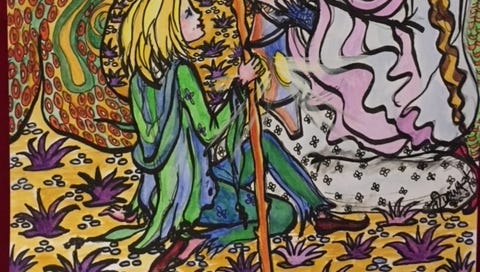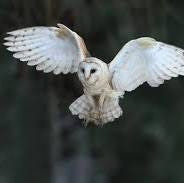INSPIRED BY IRISH POETIC SPELLS AND INCANTATIONS
EARLY HISTORY OF IRISH INVASIONS
Very early periods of Irish history have been preserved in the oral tradition of bards, poets, high priests and priestesses from the days of a colony of Africans under the command of Ciocall, the Fomorians, who preceded the arrival of traders from Phoenicia.
Partholan and his followers then invaded from Greece, fleeing after the parricide of his father and mother to attain power that caused him disfavour. He came with some of his family and a thousand soldiers, and the Firbolgs. This happened after the Flood. He was said to be descended from Magog, Japhet and Noah. Interestingly, it is documented that in this Prince’s retinue, after his death, there were four men of letters, three druids, three generals, a knight, a beatach or hospitaller of an open house like an inn, and two merchants, whose names are all preserved in the annals. The four sons, born in Ireland, ruled with great wisdom and poetry, the druids speaking in the ancient Greek language, that is in keeping with the ancient Irish Ogham tree alphabet, the Hebrew alphabet and the Greek Phoenician Alphabet.
A violent plague in A.M. 2820 wiped most of the colony away, 9,000 people died, and there was anarchy for many years after their deaths. Much of the contagion happened at Ben-Hedir now known as Howth near Dublin. The dead were all thrown together indiscriminately into a pit to prevent the spread of the disorder, at a place called Taimleacht-Muinter Partholan, the burial place of the posterity of Partholan, so it is recorded in the Book of Conquests. After the later reception of Christianity, a monastery was founded on this ground, called Taimhleacht. The monstery Tallaght is from Tamlachta… Tam means plague and Lecht means stone monument. The remains of a monastery is presently at a site south of Dublin founded by Mael Ruian in 8th Century. He brought relics of Saints Paul and Peter and also strands of the Virgin Mary’s hair that were put in a repository there. Four Saints arose from this monastery. During the Reformation of Protestantism, it ceased to be used. At Howth there was an Abbey dedicated to St Mary.
A second colony of invaders arrived after his youngest son Adhla, who had remained in Greece, had a successor called Neimheidh with his tribe who were known as the Neimhedians. They made use of four brilliant artisans from Africa who had a colony in the North, to build beautiful carved palaces for Neimheidh, who, jealous that they may do the same for others, had them slaughtered the day after they finished the projects. He also cleared twelve large woodlands to make land for tillage and also to build ships for travel.
The Fomharaigh (Fomorians) gathered their African tribes together, after the slaughter of their artisans, and fought four battles with Neimheidh, being victorious in the last one. They then lorded over the Greeks and imposed heavy taxes, enslaving them and the Firbolgs who were Israelite Egyptians already subservient to the Neimhedians. They all strove for their freedom from the Africans and Neimheidh’s successors sailed back to Greece. Briotan, son of Feargus, grandson of Neimheidh went to North Britain, and gave his name to Britain, just as Scotia, an Egyptian daughter of a Pharoah married to a High King in Ireland gave her name to part of Ireland and then Scotland.
After this the Firbolgs and Belgae arrived in A. M. 2541 and ruled.
Then the Tuatha De Danann, Danonaii, arrived in Ireland A.M. 2736. They were a very magical, mysterious, highly intelligent people descended from poets who were prophets with spiritual leanings and praise of the Divine, who had fled from Greece after an invasion of Syria and then landed in Denmark for some years in a colony. They ruled in four cities of learning: Falias, Gorias, Finias and Murias. There were sacred treasures from each city: They carried the Liagh-Fail (stone of Fal, destiny from Falias) (also known as Jacob’s Stone) on which all succeeding monarchs were crowned. It emitted a sound when any prince of the Scythian or ancient Irish race should govern in whatever land held the stone. There is a later Rann or verse that states this.
There was the Spear of Lugh from Gorias, the Sword of Nuada from Finias, and the Cauldron of Dagda from Murias, all magical implements of destiny. Four poets who were spell enchanters also came from each city. It was considered that this tribe was descended from Deities who emerged from the first Age, and still had remnants of their Deity powers.
Patrick McGough, a renowned historian, researcher and translator, spent a lifetime researching and creating a History of Ireland in 1700s. I have his extraordinary book that had been housed in a library and was almost destroyed by an IRA bomb in one of the big houses in Northern Ireland. I bought it in a rare book auction in Florida while researching Cormac macAirt, and had it restored. He quoted:
The Brigantes of Spain, (so called from Breogan, grandfather to Milesius) became a respectable, warlike, and commercial people about A.M. 2600. A part of their prosperity conquered Ireland in the year of the world A.M. 2736. According to Hebrew computation, in the month of Bel or May, and the 17th day of the moon’s age, according to the relation of Amhergin, high priest to this expedition of the Milesians, Ireland was invaded by a numerous body of select troops from Galicia in Spain.
Amergin, as we now know him, was a poet magician who wrote in the first person, using metaphors to identify himself with various elements of nature. These were considered spells to break the magical use of words and powers over nature that were used by the learned High Druids, who could raise fogs and mists to lose the ships of sailors and invaders.
This is a famed fragment of the magical chant: The Rose of Amergin (translated by UaMeadhra):
I am a wind gust on the sea,
I am a footfall of a wave.
I am a roar of the sea,
I am a stag of seven times,
I am a hawk on the cliff,
I am a tear of sunlight,
I am a cry of love,
I am a boar in rage…..
(He goes on to paraphrase the god’s strengths, as being within himself)…
I am the god who kindles fire in your head…
Who can count the ages of the moon?...
Who is the horned one, the god who forges?...
Who incants the weapons and calls up winds?...
Many bards and poets throughout the ages have claimed descendance from Amergin.
However, Ireland has always been the land of rhyme and poetry.
I have loved poetry and written it from an early age. It was drummed into me at school. Although the sting of the cane for forgetting lines in poetry, far from making me pay more attention, rebelliously deterred me from memorising it in the oral tradition again, except for the school curriculum. It never stopped my writing.
My poem in the style of Amergin:
SEEKING
I am the breath of the wind that fans the turf on Lir’s vast plain,
I am the whispering grasses that billow and chase across proud lands,
I am the notion of sunshine rays in slaughtering winter,
I am the alarm in the gale that blows upon the battle slain,
I am called for the heaving storms that rush and quicken the shifting sands,
I am the motion of the lightning flash in the oakwood splinter.
My name is the voice of the one who knows the flowing river of words,
My name is the heart of the leaping salmon of Brea,
My name is the beauty arrayed in the light of the eyes of the dawn.
My name is the starry cloak of night and the shivering call of birds,
My name is the dark dulse lapping and floating on the sea-green bay,
My name is the belling of the woodland stag to the tawny doe and fawn.
EAGLE OF THE NIGHT (THE OWL)
(Poem to keep safe in the night and enrich the power of the Muse.)
Eagle of the night, friend of strangers in the dark,
Seer of the unseen,
You who are of silent feathers, Companion of Athena,
You who bring light to those without sight.
Be my eyes in the blackest of deep places,
Be my breastplate of wisdom in the Court of Indra,
Be the bearer of keen insights in soothsaying
And the revealer of Truth in all omens and faces.
Eagle of the night, guardian owl of all forest trees,
Keeper of the woodland,
You who are witness to secrets, Companion of Hecate,
You who bring solace to walkers of the twilight,
Be my ears in the depths of noiseless places,
Be my potent quill in the writing of sacred Law,
Be the plumed cloak of refuge, talon and claw,
And the revealer of mysteries in all arts and graces.
Most poetry is of an emotional and intellectual nature, an expression of the soul, and because it comes from that ‘other place’ of observance and sometimes prophecy, remote viewing, or channelling, it can be an incantation, a spell, a memory, a lamentation or a blessing, just like a song, and can move others to tears or a smile.
It is important to guard one’s words and treat them as having certain powers so that we do not use them to heap false praise or hurt others, nor use them to curse, slander, lie, or satirize others unfairly to destroy reputations. The pen can be mightier than the sword and carries the same weight of karma with it. Make it your friend to love, heal, and make well in the world, not the enemy to stir trouble or hauntings that can bounce back. Create happiness to remove sorrow and maybe even save the world with just thoughts and words.
DWINA***






Very informative and nice poetry, I thoroughly enjoyed this article.
It is rare that i love a poem, there is a lit fest every year, quite near me, that i attend, but the modern poetry, i dislike. This poem of yours i love, especially, because i felt it.
"My name is the heart of the leaping salmon of Brea,
My name is the beauty arrayed in the light of the eyes of the dawn.
My name is the starry cloak of night and the shivering call of birds,"